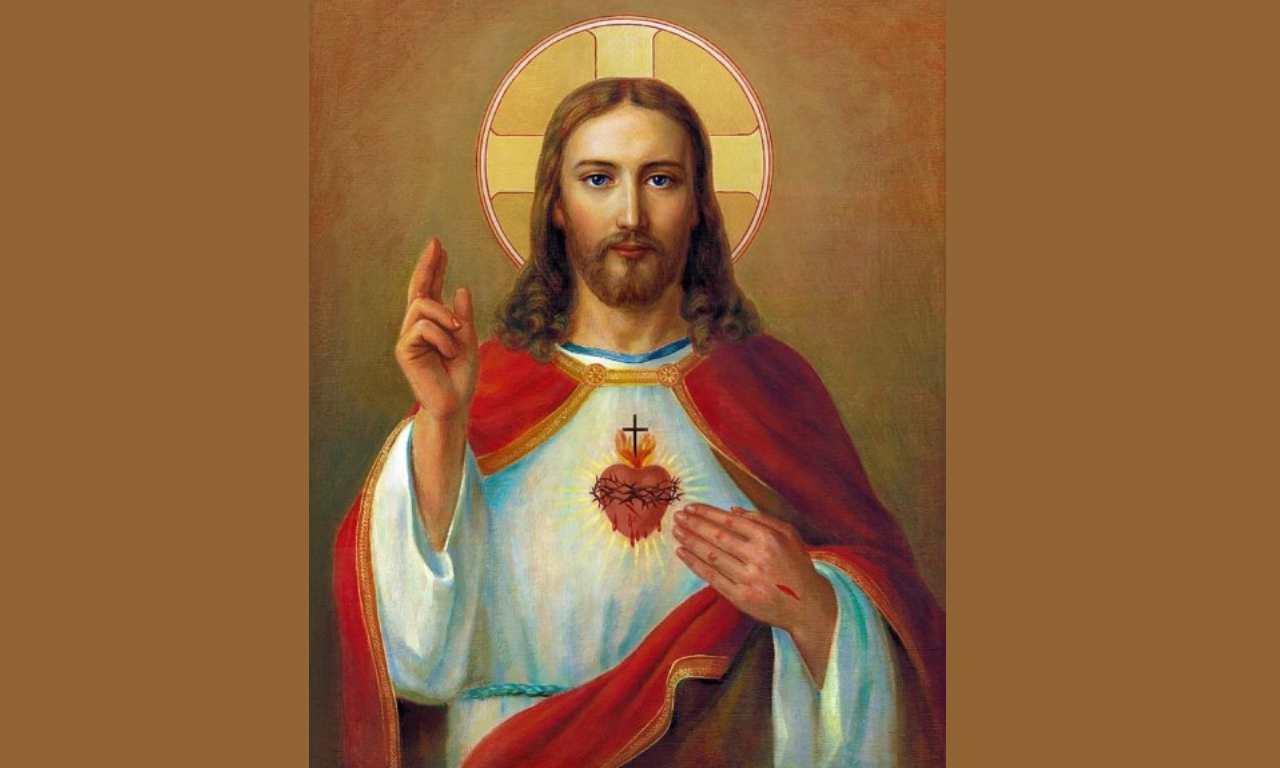Have you had enough of the pride and uber-deviance of groups like the Sisters of Perpetual Immunodeficiency?
Now that we’re almost through Gay Slime Month, let’s try something better than ostentatious displays of pride. How about some contemplation of the infinite and indivisible Divine Love?
Ah, if only it were that simple. Alas, the greatest stumbling block to Divine Love may be . . . finding an operable definition for it. Furthermore, as they say, you can’t love what you don’t know, and it’s true of the concept itself.
How stifling that scarcely anyone knows what love is. We just celebrated the glorious Feast of Corpus Christi with Eucharistic processions and adoration, a faith-filled way to celebrate the greatest gift of love.
Well, a few people did that.
Most folks, instead, took their children to drag shows. The Vatican, with Bergoglio in and out of the hospital, held no Eucharistic processions, but had plenty of time for gay dancers for “human fraternity.”
So, with this tragic collapse in decency and charity, what exactly is love?
Defining Love

To define love, let’s consult the intellectual giants who’ve given the most profound treatment to the topic. How about Aristotle and St. Thomas Aquinas? The former was a pagan philosopher genius, whereas the latter is probably our smartest guy in Church history (after Our Lord and Our Lady).
Aristotle categorizes love three ways: 1) Eros (lower passions; sexuality; contemplation of beauty), 2) Philia (friendship; love of country), and 3) Agape (brotherly love for humanity). Agape is the noblest form. For Aristotle, a “virtue ethicist” from ancient Greece, this higher love involves helping one another (friends, family, neighbors, acquaintances) grow in virtue.
While the first two concepts have their place, these are vastly inferior and subordinate to Aristotle’s highest form, Agape. This is important because we see abundant examples of how contemporary culture inverts this order. Modern Americans dwell on limitless Eros, have very little concept of Philia, and virtually no concept of Agape.
Agape is also the closest to St. Thomas Aquinas and the Church’s comprehension of love (“caritas” or “charity”). That’s where we think of it, in Christian terms, as “willing the good of the other.” We also, of course, would say that the ultimate good involves each of us gaining eternal unity with God.
The love of God encompasses elements of all three Aristotelian concepts. It involves contemplating His awesome majesty (Eros), pious friendship with God (Philia), and, finally, the ultimate – conforming one’s will to God’s (Agape).
God’s Love: His Divine Will
Finally, let us distinguish between submitting to God’s will (true love) versus merely “accepting reality.” The pagan stoics could handle the latter. They would remain calm amid any circumstances, joy or suffering.
We’re called to love God by conforming to His will by accepting every temporal thing that happens (joyful or miserable) as His Divine Providence. This is not just some resignation to “the fates” like pagans would do.
It’s a deeper confidence that even miserable conditions will yield to something better because God’s will (even when He permits horrible things) reflects love. In the long run, everything will be fine, if we have genuine love, energized by faith.
Understand Love (the Concept) or You’ll Just “Love” Your Cat
Why do all these Greek words and concepts matter?
Because, as I mentioned, the typical westerner, deprived of proper education, catechesis, basic manners, or dignity, CAN’T DEFINE “LOVE.” If you can’t define it, you’ll neither comprehend God’s love, nor realize why you should love others (or even oneself). Most folks don’t believe heaven (eternal union with God) is relevant, either because nobody’s explained it to them, or they possess some hangup regarding whether their pets will be there.
That’s quite something to behold.
The typical American has more passion (which they mistake for love) for their dog or cat than they do God, neighbor, friends, family, or themselves. You’ll know this when you broach the topic of heaven with them. Whenever you do that, the first thing they ask is whether their beloved critter (or other animal companions they’ve ever had) will be with them upon arrival.
They literally rank the value of unfathomable, perpetual bliss, gladness without alloy, and the ability to behold our awesome Creator . . . beneath their “quality time with pets.”

Leaving aside their probable mental illness, it would be nigh on impossible for these folks to have any concept of love, sacred contemplation, or even legitimate friendship. So, it does little good to harangue them for not loving God or neighbor (the two Great Commandments), because you may as well be speaking an alien dialect. You’d have a better chance of explaining particle physics to someone who’s never so much as heard of an atom.
Pray for folks who are in the “my cat better be in heaven” camp. There’s not much you can do to help them directly. There’s a high probability they’re mentally ill, will want to argue, and you should maintain a policy of never doing that.
A Complex Math Equation for God’s Love
Many modern men believe they are too far gone for God’s love.
While there are many ways to sin against charity (hatred, envy, sloth, discord, and so forth), many commit the grave sin of despair. This is a tacit way of deciding that God’s love isn’t boundless and abundant. Today’s man embraces a philosophy of nihilism (from the Latin “nihil,” meaning “nothing”), economic theories of extreme scarcity (Great Resetters, environmentalism), and a theology of “soul annihilation.”
In short, they listen to people, like Jorge Bergoglio, quite often.
None of these dismal thought systems correspond with faith, hope, and charity for obvious reasons. Man’s lot in life, as the pessimistic philosopher, Thomas Hobbes, would say, can be nothing better than “solitary, poor, nasty, brutish, and short.” At this woeful state, man despairs of God’s love and retreats to base pleasures, those so common among the profligate Gay Slimers.
Since this has become so popular (even among today’s scholars and leaders), does this mean we’ve been wrong the whole time about the infinitude of God’s love?
No! To show why, I’ve developed a complex mathematical formula to illustrate the scope and magnitude of God’s love. It normally requires an advanced Mega-PhD degree in quantitative analysis for proper comprehension, but I’ll risk the confusion by divulging it here . . .

What does this formula mean?
It’s a way of expressing how God’s love is indivisible. No matter how many people come along, God’s love is infinite (and infinitely available to an infinite number of us). Whether it’s just Adam and Eve (X=2), or 10 billion people (X=10 billion), the value on the other side of the equal sign never changes; it’s always ∞. Moreover, he can express it, infinitely, onto each of us, whether we’re isolated and alone or among centillions of others.
If only someone would explain this to “population bombers” like Thomas Malthus or Paul Ehrlich.
If you can comprehend the gravity of this, then it should be tremendously consoling. God has not exhausted all his love (including those precious “temporal resources”) on those “luckier” folks around you. He has more than enough in reserve for you, even if you committed every sin championed by the Sisters of Perpetually Irradiated Innards, times 1,000.
That is . . . provided you repent, amend your life, fast, and do other penances.
The Rapidity of God’s Love & The Changes in Your Life
So, there is still hope even if you are one of those who are way out in left field (perhaps at Dodger Stadium with the Sisters of Perpetual Inguinal Hernias). If you’ve never heard of St. Augustine, now is as good a time as any to see how fast a spiritual revolution can occur. There, you’ll find a story of a man who never indulged in “gay pride,” but was no stranger to sins of flesh, before converting and accepting God’s infinite love.
Even for the virtuous pagans, the conversion speed might seem capable of breaking the sound barrier. St. Augustine’s mentor, St. Ambrose, was one such example. He went from being unbaptized to a bishop within eight days.
What were you doing eight days ago?
Well, I don’t know about you, but seven or eight years ago, I had little to no interest in Catholicism. If you had pressed me about it, I would’ve told you I thought of it as a bad club. I thought it was an institutional relic, dominated by obvious queers, offering no real value, and the nerve to impose strange norms and rules on others. I might have compared the Catholic Church to some warped fraternal organization or HOA.
Worse yet, I knew nothing of the faith. Seven or eight years ago, the following applied to me . . .
- I couldn’t have told you who the first pope was (John the Baptist? Who cares?).
- Whenever I heard someone mention prayer, I assumed the “prayer warrior” was just someone begging God for material items and superficial benefits.
- NOTE: There are indeed folks who pray this way, but it was my assumption that this represented ALL Christian prayer.
- After receiving First Communion in 1993, it would take over 20 years to go to Mass again.
Why do I mention this?
Because if folks like myself, St. Augustine, and others can experience a dramatic conversion, then anything can happen. In many respects, I have the world to thank for my conversion. In a future post, I’ll explain why today’s wretched circumstances are the best for making a conversion.
If it wasn’t for how hideous things have gotten, I would have never looked for an alternative. A depraved world can be a tremendous blessing, taken in the proper context, at least if you can scrounge up a modicum of cooperation with God’s grace.
God’s Love > Gay Slime

So, doesn’t God’s love seem far more appealing than the lower passions of Gay Slime?
This assumes you have an elementary grasp of delayed gratification, however. While God’s love has many manifestations in this life (sometimes subtle, sometimes obvious), the best part is reserved for later when we conclude our pilgrimage of this world. You must wait, suffer, and persevere to reach the fullness of God’s love in eternity.
This is a staunch contrast to the immediate gratification you see throughout the prevailing culture, always catering to the childish “I want it now” mentality. It’s also perhaps why the Gay Slimers (those indulgers) seem an awful lot like unruly children. Therefore, even if you don’t comprehend the math equation (God’s Love / (X) = ∞, where x = the # of people), you can still grasp this truth by observing the consequences.
Which do you prefer: civilized delayed gratification in Christian culture or the scorched-earth hell-raising from the indulgent crowd? Which of these is sustainable? Do you have a clear-enough mindset to even desire sustainability and flourishing, unlike the nihilistic climate-change folks?
Ways to De-Slime
Hopefully, you desire the triumph of Our Lady’s Immaculate Heart, the next great epoch of God’s infinite love. If so, then you know the drill . . .
- Pray the Rosary (15 decades) every day.
- Do penances, especially on Wednesday, Fridays, and Saturdays.
- Follow every traditional Church teaching with every fiber of your soul.
- Avoid modern music where the artists assert stupid/evil notions like “love is an animal.”
- Stop overindulging.
In my next post, I’ll delve into a specific type of love (between married partners), and provide some insight into Catholic “matchmaking.” This will include some insight into Tim Gordon’s new dating program.

